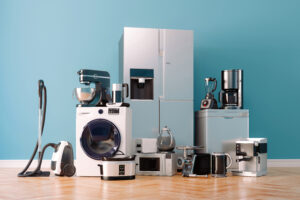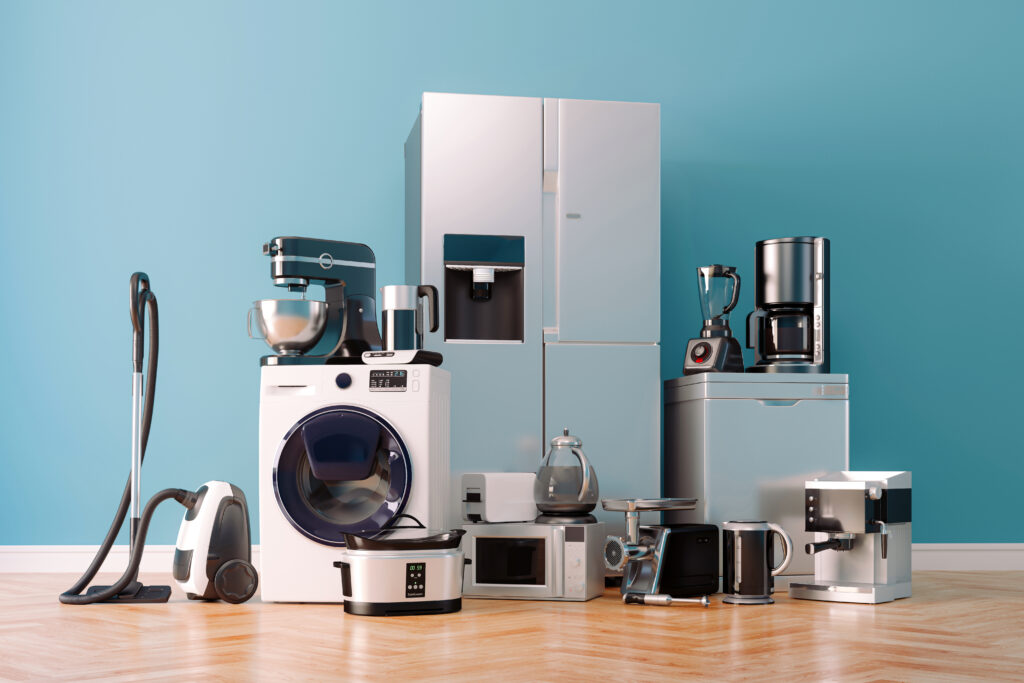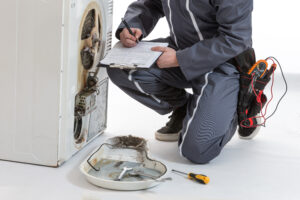
*Updated December 8th, 2025
Home appliances are the unsung heroes of our daily routines. From washing dishes to keeping our food fresh, every home appliance helps life run more smoothly. But when an appliance malfunction hits, it’s a whole different story. A sudden appliance breakdown can quickly turn your day upside down—leaving you with dirty dishes, still-damp laundry, or a fridge full of spoiled food.
While calling a professional service is always an option, it can be costly and time-consuming. The good news? Not all appliance issues require expert-level appliance repair. Some of the most common appliance problems involve minor problems that a homeowner can troubleshoot with basic tools.
In this guide, we’ll cover five common appliance problems and repairs, showing you problems and how to troubleshoot them. Whether it’s a clogged dishwasher, a leaking washer drain, or a dryer problem where clothes are still damp, these tips help keep your appliances running and working properly.
Washer Appliance Breakdown: Washing Machine Not Draining
There’s nothing worse than opening your washing machine to find standing water inside. This is one of the most common appliance issues caused by drainage problems and often leads to a service call.
Start with the drain hose. This flexible tube moves water out of the washer, but it can twist, clog, or fill with lint, soap residue, or coins. Disconnect the hose and flush it with soap and warm water to remove food debris, buildup, or blockages.
Next, check the drain pump filter. This catches small objects before they damage the drain pump. A jammed filter can trigger a malfunction that stops water flow.
If the unit still won’t drain, the control board or pump motor may have failed and may need to be replaced. That’s when it requires professional repair service.
Dishwasher Problems: Dishwasher Not Cleaning Properly
If your dishwasher issues leave dishes dirty, it’s time to address this common dishwasher problem. Poor performance often stems from clogged drain, blocked spray arms, or a worn gasket.
Remove the spray arm and inspect the holes for food debris and mineral buildup. Clean them thoroughly.
Then pull the bottom filter and rinse it clean. A blocked filter prevents water from circulating, creating one of the most common appliance problems and repairs homeowners face.
If poor cleaning continues, the control panel, sensor, or pump may be failing and may need service from repair pros.
Common Refrigerator Issue: Oven Not Heating Properly
When an oven or gas range stops heating, the problem often relates to faulty heating element, thermostat, or ignition failure.
First, check the circuit breaker for power issues. Then inspect the heating element for visible damage.
Also test the sensor inside the oven. If heat regulation is off, a faulty sensor or control board may be preventing the oven from working properly.
If repairs go beyond testing components, call a professional.
Dryer Problems: Clothes Still Damp After a Cycle
If your common dryer issue involves clothes that are still damp, airflow is usually the problem. Check the lint trap and perform cleaning the lint after every cycle.
Next inspect the vent, exhaust duct, and outside airflow exit. Poor airflow causes moisture buildup and overheat risks.
If airflow is clear but clothes won’t dry, you may have a faulty heating, blown thermal fuse, or bad thermostat. These are common dryer problems that require testing.
Appliance Today: Dripping Window AC Unit
A dripping AC unit is one of the most overlooked home appliance leaks. If water pools indoors, the internal drain system is blocked.
Remove the unit and clear the drainage opening. Also make sure the AC is angled outward to encourage proper water flow.
If water still leaks, the internal components such as the evaporator or pump may be damaged and requires professional diagnosis.
Conclusion: Keep Your Appliances Running Smoothly
With regular maintenance, homeowners can avoid many common issues and keep household appliances in proper working order. From cleaning the coils on your common refrigerator to avoid overloading your washer, small steps prevent appliance breakdowns.
When repairs exceed basic fixes, always call a technician or trusted appliance expert to protect your investment.
FAQ: Common Appliance Questions
Why are all of my appliances likely to break at the same time?
Power surges, faulty wiring, and extreme weather are leading causes of simultaneous appliance breakdowns.
What is the lifespan of home appliances like washers and refrigerators?
Most appliances purchased between 2008 and 2018, according to the research team at Consumer Reports and survey research team at Consumer, last 8–15 years with regular maintenance.
Which appliances are one of the most common to fail?
Units exposed to moisture—including the dishwasher, washing machine, and fridge—are statistically one of the most common to need repair.
Additional Appliance Resources
- How to Extend the Lifespan of Your Appliances
- Troubleshooting Tips for Common Washer and Dryer Problems
- The Top Home Appliances that Can Save You Money

Anna has over six years of experience in the home services and journalism industries and serves as the Content Manager at MyHomePros.com, specializing in making complex home improvement topics like HVAC, roofing, and plumbing accessible to all. With a bachelor’s degree in journalism from Auburn University, she excels in crafting localized, comprehensive guides that cater to homeowners’ unique needs. Living on both coasts of the United States has equipped her with a distinctive perspective, fueling her passion for turning any house into a cherished home through informed, personalized decision-making.
Connect with top-rated local contractors who can help you with siding, roofing, HVAC, windows, and more. Get free quotes from verified professionals in your area today.







